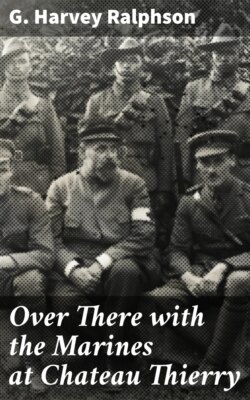Читать книгу Over There with the Marines at Chateau Thierry - G. Harvey Ralphson - Страница 3
На сайте Литреса книга снята с продажи.
CHAPTER I
PHIL AND TIM
ОглавлениеTable of Contents
Top Sergeant Phil Speed did not know exactly where he was when the long train of trucks bearing hundreds of khaki-clad American Marines stopped at a small town within easy gun-roar of the battle front in France. They were making little demonstration now. For weeks they had been cheering and been cheered until their throats became sore and well again—calloused, as it were. So spontaneous and so nearly universal had been the enthusiastic reception extended to them everywhere that it seemed as if every person who didn’t yell his head off must be pro-kaiser.
With the noise of battle becoming more and made distinct through the rumble, roar, and rattle of trucks and ordnance racing toward the scene of conflict into which they themselves were about to plunge, the hearts of these messengers of liberty were not so gay as they had been for weeks, aye, months, before. Everywhere, among all sorts and conditions of men, even among fighting patriots, there are bound to be a few “smart” ones who forget the proprieties sometimes as their bright ideas go skyrocketing. And this sort of gay wight was not lacking even among the pick of America’s young manhood; but for once the gayest of them were serious and sober minded.
The person who would joke in the face of death, or with a messenger of eternity lurking in the vicinity must be a philosopher “to get away with it.” Phil had no idea of putting the thing in such language, but if somebody had stepped up close to him and whispered the conceit in his ear, he probably would have responded, “That fits the situation exactly.” Still a considerable period of time elapsed before he was able to dispel all doubt as to the occasion of such unwonted sobriety.
“I wonder if we’re not all cowards, and if that isn’t the reason we’ve all stopped our noise,” he mused. “I hope we don’t turn tail and run lickety-cut when we see a big bunch o’ boches swinging over the top at us.”
As if in reply to his musing, Timothy Turner, a training-camp chum, who stood at his elbow in the midst of the throng of soldiers waiting for orders to move along, spoke thus rather grimly:
“We’re quite a solemn bunch, aren’t we, Phil? I guess what we need is the explosion of a few bombs in our midst to get us good and mad.”
“Maybe,” Phil replied, regarding his friend meditatively. “Well, it won’t be very long before we’ll have a chance to find out. Do you think an explosion a few feet away from you would make you mad, Tim?”
“Yes, I do,” the latter replied unhesitatingly. “I believe it would make me want to telescope with the next shell that came whistling along.”
Tim was a kind of bullet-headed Yank, “built on the ground,” his school-boy friends used to say. Really he looked as if he might be accepted as a personification of that irresistible force which would create “the most powerful standstill” if it struck an immovable object. But in spite of his bullet-headness, Tim was anything but dull. Both officers and fellow soldiers regarded him hopefully as one of the prospective star fighters of the regiment because of his mental keenness as well as his physical prowess.
Phil was built along different lines. He was strong and athletic, but he would hardly have been expected to be able to push over a stone wall. Whether or not he was more intelligent than Tim may be a matter for debate. It may be admitted, perhaps, that he was not so shrewd, but if they had both lived in the middle ages, Phil undoubtedly would have listened with interest to the first declaration that the world was round, while Tim would just as surely have repelled it with derision. But in business Phil might have fallen a comparatively easy victim to the wiles of a trickster, where as the cleverest “con man” would have had to get up very early in the morning to catch Tim napping.
So here we have a double-barreled standard for measuring intelligence among men and among boys. Shall we call Phil more intelligent than Tim, or vice versa? Let us dismiss the debatable question without answer, while we admit that they were both intelligent, but different; and in spite of their difference—some would say “in consequence of their difference”—they were very good friends.
